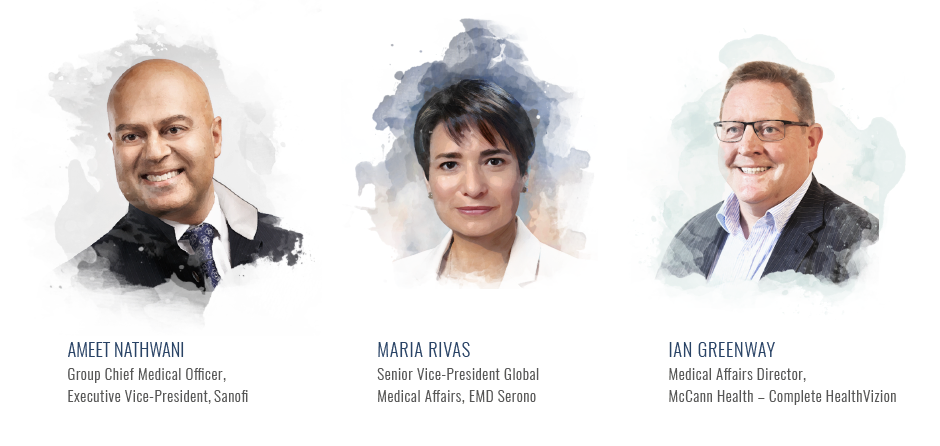Interview by GOLD
There is a saying that good chess players will think five moves ahead and great chess players only one, but it is always the right move. The recent blossoming of big data has amplified the calls for the pharmaceutical industry to join the likes of Amazon and Google and master the digital game. However, with pharma having previously been criticised for lagging a few moves behind (let alone being ahead), how can teams construct a game plan to make sure they are prepared for the changing landscape? Equipped with the ability to leverage and generate a deep knowledge of products and diseases, medical affairs are perfectly placed to take a seat behind the chequered board and formulate a strategy that will grant them checkmate. Three professionals share their insights on how MA can plan to stay ahead and stay relevant.

How do you stay on top of your engagement strategies, continually monitoring and improving them so that questions are being answered in the way and place customers want?
Nathwani: We are looking at omnichannel approaches to reaching physicians through digital and non-digital channels they are more familiar with to immerse them in the relevant information at the right time. MA organisations must master this approach and have a stronger understanding of customer/physicians’ preferences. As with the technical aspects of evidence generation, we need to understand the changing roles of our customers and the technologies they are using – that means getting information to their laptops, mobile devices, and closer to the point of care, so that they have it where it is most relevant.
Rivas: MA are in a position to develop a scientific communication platform that guides effective engagement and is tailored to the scientific community and to healthcare stakeholders throughout a product’s life cycle. This platform should be forward-looking and updated on a periodic basis to ensure it meets the informational needs of relevant audiences.
Greenway: The customer engagement plan must be a key pillar of the medical planning process so that for each objective, the key stakeholders involved are identified and tactical strategies for meeting their individual needs are planned. Developing a clear understanding of the patient pathway and stakeholder touchpoints is key, alongside understanding how each stakeholder is most receptive to knowledge exchange. Only then will the resulting communications be fully effective in fostering positive change in healthcare.
How does a MA department put a strategic plan in place to make sure they are equipped with the right capabilities to handle a new era of big data?
Nathwani: As much as we need to apply new technologies with accompanying new analytical capabilities, we also need to change our mindset to accept that the use of approaches such as artificial intelligence can significantly improve our understanding of the risk-benefit of our products and help guide clinical decision-making. We need to get to a place where for each product we are consistently and continuously looking at clinical data and real-world evidence (RWE), adjusting our understanding of the risk-benefit profile, so that it becomes an iterative feedback loop, which we can then quickly and clearly communicate back into the community.
Rivas: It is essential that MA work with product and market access teams to forecast RWE that will be important for investigational therapies to gain access and improve patient care. RWE generation is a highly multidisciplinary activity and it’s hard for a MA team to build the required expertise in-house. They therefore need to leverage their innate ability to develop appropriate collaborations with external stakeholders in academia, managed care, government, and both the clinical and the patient advocacy communities, enabling MA to significantly contribute to the body of RWE on products.
Greenway: Currently, MA teams have limited expertise in the integration and analysis of discrete data sources to analyse patterns to be able to answer questions regarding real world use of current therapies and to predict future trends. Development of the MA skillset occurs most effectively by liaising with expert partner organisations. This assists the MA team in developing strategic plans using existing RWE to answer questions posed by the situation analysis and medical objectives in the most efficient and timely manner.
What do MA need to do to stay on top of the transforming healthcare policies so that the work they do today is still relevant tomorrow?
Nathwani: We need to be proactive, continually engaging with key stakeholders within our company and outside to understand the external environment. With that knowledge, we can work with colleagues in R&D to generate and analyse data which will meet the evolving needs of our stakeholders. MA needs to be deeply versed in and continually updating itself on the understanding of how healthcare systems in different countries work and become part of the dialogue on the implications or impact of healthcare policies.
Rivas: Good MA planning begins early in clinical development. These plans should contemplate both short-term (1 year) and longer term horizons (>1 year) and include current trends and evolving challenges in patient care and healthcare systems.
Greenway: By developing, and constantly maintaining a cross-functional target product profile and summarising the planned attributes of the product and the market landscape that is expected at time of launch in each geographical region, the MA team have a tool that ensures the medical plan is continually assessed for relevance. The utilisation of RWE in the medical planning process to demonstrate medical value and improved patient outcomes allows the team to provide market-based strategic input to the drug development process.
Like with chess, you can’t just rely on one piece to win the game – you must use all of them. From this discussion, it seems that by utilising their position to collaborate internally with other departments and externally, MA can develop both their in-house capabilities and RWE evidence in addition to delivering the appropriate information through the right platforms. However, the importance of remaining proactive and flexible cannot be overstated – after all, like chess, the board is constantly changing and even if you checkmate one opponent, the board resets when you face the next challenger – for whom you may require a whole new strategy.









